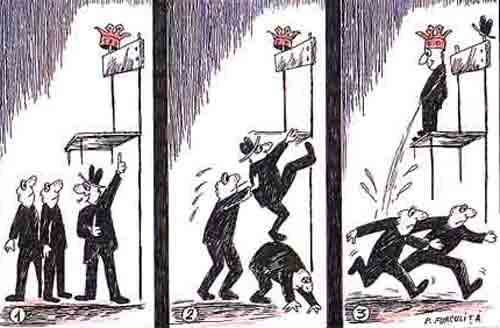polis-, polit-, poli-
(Greek: city; method of government; citizenship, government, administration)
Don't confuse this polis, "city" with the suffix -polism, etc. meaning "selling".
"Some politicians are seekers or holders of a public office who are too often more concerned about winning favor or retaining power than about maintaining principles."

There are some politicians who betray the citizens
who have helped them gain political power.
2. To give political awareness or flavor to.
3. To make someone politically aware or active, or to introduce a political element to something.
2. Political science: The activities or affairs engaged in by a government, politician, or political party.
3. Although plural in form, it takes a singular verb when used to refer to the art or science of governing or to political science: "Politics has been a concern of philosophers since Plato."
The word "politics" comes from Middle French politique, "political" from Latin politicus "of citizens" or "the state, civil, civic," from Greek politikos "of citizens or the state", from polites, "citizen", from polis, "city".
2. An organized society; such as, a nation, having a specific form of government.
2. It is defined in the Oxford English Dictionary as a red, resinous, aromatic substance collected by bees from the viscid buds of trees; such as, the horse-chestnut; used to stop up crevices and to fix the combs to the hives; bee-glue.
2. Reference to a partially political nature; having some political features.
As might be expected from its name and the name of its county, Thermopolis is home to numerous natural hot springs, in which mineral-laden waters are heated by geothermal processes.
It claims the world's largest mineral hot springs as part of "Hot Springs State Park".
The springs are open to the public for free as part of an 1896 treaty signed with the Shoshone and Arapaho Indian tribes.
2. Capital of Libya and the largest city in the country, located in northwestern Libya.
3. Literally, Latin for "three cities".


